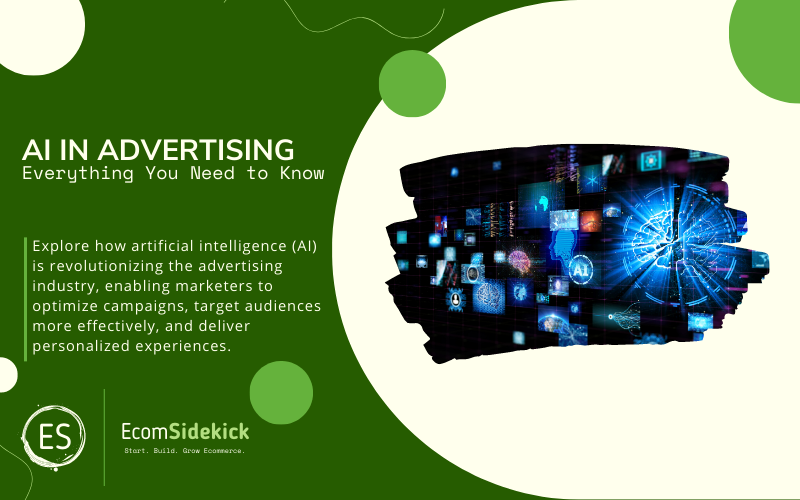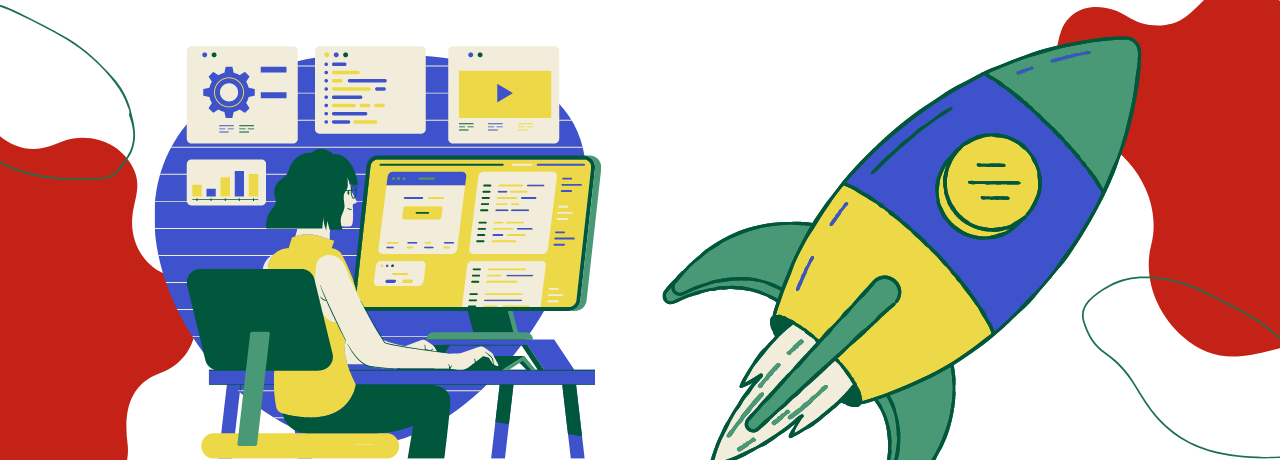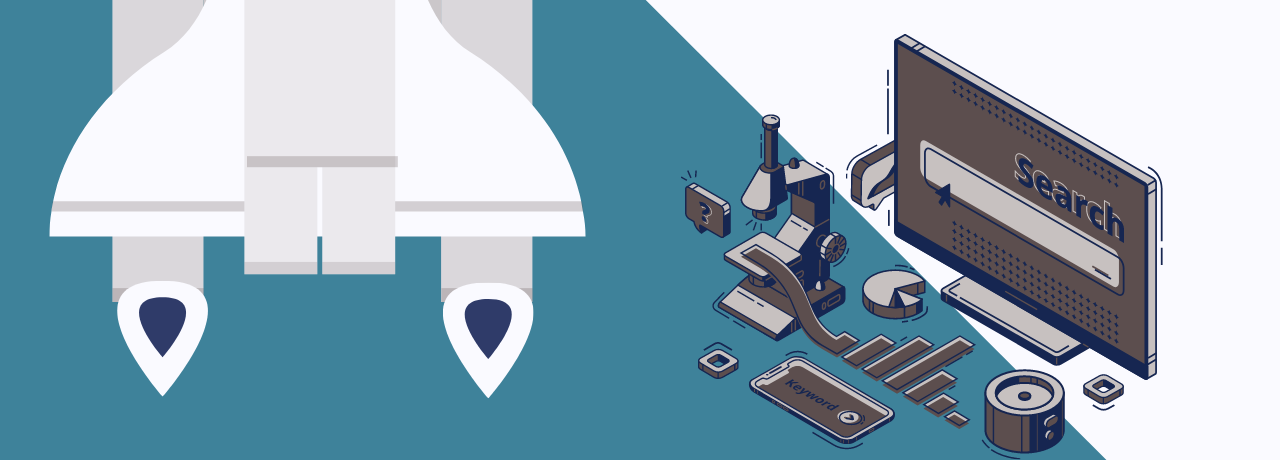The ways of marketing have evolved a lot over the years. With the advent of the internet, many strategies have been improved. Marketing automation is one of these significant changes that have changed the world.
And although it is a new subject, we will mention how ai in advertising can be an excellent advertising tool. Companies can leverage this to grow their businesses.

With the coming out of ChatGPT, it is about to get really good. If you do not know how to use it, outsourcing some creative or copy work to would be helpful so that you can still take advantage of the scalability of this tech.
Do You Know What AI in Advertising Is?
In short, artificial intelligence advertising uses this tool to make automated decisions based on collected data, data analysis, and additional audience observations. Making these decisions is possible by mentioning economic trends that will improve marketing efforts.
With the help of AI, marketers can observe their more accurately and comprehensively about their target audience. The insights generated by Artificial Intelligence are grouped through an optimization process, which can be used to create conversions while also easing the workload of marketing teams.
Artificial Intelligence is already used in marketing and communication in several activities. AI enables software to make human-like decisions in various industries, leading machines to process data effectively by analyzing a high volume of data and responding to each user’s behavior.
The absence of intervention from marketing staff members will give these people the freedom to work on creative marketing campaigns. In this sense, you can use AI in many situations, some of which are listed below.
Artificial Intelligence, List of Benefits |
Media buying: this tool can predict the positioning of media and ads that are efficient for your company, aiming to reach your target audience and maximize the ROI of the marketing strategy. |
Content Generation: you can use AI to write long or short content for marketing strategies. This content could be video, email subjects, blogs, web copy, and other various possibilities. |
Data Analysis: data analysis and collection can be done on large amounts of marketing data from various campaigns and programs. AI saves a lot of time from an activity that would once have been done manually. |
Automated Decision Making: Making decisions takes a lot of work. But with Artificial Intelligence, you will be helped to decide which marketing or growth strategy to use. And this decision is based on previous data or external data input. |
Real-Time Personalization: with the use of marketing resources, with the help of a Web page, Email, or post, it is possible to change the experience of your customers. In this way, execute your customer’s previous preferences and encourage them to do a specific action, such as signing up for something, buying a product and service, or clicking on a Link. |
Natural Language Processing (NLP): with the evolution of artificial intelligence, it is possible to use it to create human-like language for content creation, customer experience personalization, customer service bots, and several other features. |
Practical Examples of AI in Marketing

RedBalloon
Naomi Simson, owner of the company called RedBallon, has a website selling experiences and gifts. Simson said she spent about $45,000 monthly for a marketing agency to do her branding. In other words, she paid about $50 to get a customer.
This significant expense led Naomi to search for all the most beneficial possibilities. When she found an AI tool for advertising called “Albert,” a very sophisticated mechanism for analyzing advertising campaigns, testing, budgeting, and managing targeting, she realized how much she could save and boost her sales.
This tool can perform tasks that humans cannot. In one day alone, “Albert” tested approximately 6,500 variations of a Google text ad. And with the data from the results, the tool learned from the experiment. And over time, this tool demonstrated extreme effectiveness in learning from the results and data, dramatically improving RedBalloon’s performance.
The company’s return was impressive, reaching a 3,000% return on ad spend. In addition, the company reduced marketing costs by 25%. And these fantastic results happened thanks to the AI advertising system, demonstrating extreme efficiency.
Holt Cat
With new sales slowing down, the “Holt Cat” company, specializing in heavy equipment, decided to turn to AI for creating advertising campaigns that could attract potential customers in more effective and faster ways.
Based on the AI system “AiAdvertising,” Holt Cat integrated employee data with this tool, thus being able to customize ad messages to attract top candidates for available jobs. Using this tool, they could clearly see ROAS and reduce their ROAS per hire by up to 20%. In addition, the company has hired 270 people since it started its campaigns, and on average, 40% of its hires have been due to AI advertising.
Vanguard
This is one of the largest investment firms in the world, with about $7 trillion in assets under management. Vanguard looked to Persado AI language platforms to do their custom advertising.
The Vanguard’s marketing environment is concurrently highly regulated, limiting itself to running ads on LinkedIn. In that sense, due to regulations the company was subjected to what it could and could not say in ads. Its financial services ads needed more straightforward strategies to stand out.
Using AI Vanguard, they could personalize their ads by trying them on a large scale th. Reservation of which approaches resonated with consumers. And with AI, this Personalization and testing were possible. The result was surprising: Vanguard saw its conversion rates increase by 15%.
AI Marketing Tools

Above we cited some real-life examples of how AI can be crucial to your business success. However, you must know what the primary AI in Advertising tools is. Below we list some of them:
Albert
“Albert” Software works very well in AI-powered advertising. This AI platform analyzes data from your ad accounts and also customer databases. With this data, the AI learns how to target, optimize and execute your ad campaign.
Beam.City
Quickly and affordably, “Beam.City” helps its customers with Artificial Intelligence-based ads across millions of websites.
Using AI, Beam.City automatically configures ads by learning, recognizing, and monitoring patterns for optimizations of your ads. In addition, you can also use AI to create predictive data sets for custom targeting based on where your potential customer works and lives, such as in the US or Canada.
AiAdvertising
This fantastic tool takes the guesswork of how to get your ads’ return on investment (ROI). Artificial Intelligence learns every step of the advertising process and customizes it to each brand’s specific key performance indicator (KPI).
And as a consequence, marketers can scale, forecast, and execute customized campaigns. During this process, it is possible to eliminate all wasted time and apply it to better performance.
According to AiAdvertising, what used to take around 24,000 hours of human labor, can be done by their system in three days. This revolutionary technology completely eliminates human guesswork, which is often flawed and will provide insights based on the data analyzed and gained during each phase of the marketing campaign.
OneScreen
An Artificial Intelligence software focused on out-of-home ad targeting, delivery, and measurement. With a robust learning algorithm, OneScreen has powerful learning that optimizes which content and ads should be displayed to audiences, discarding out-of-home advertising assumptions.
Persado
A custom Artificial Intelligence decisioning and content generation platform, Persado has an ad language to increase your conversion rates on ads from Facebook, Linkedln, and various other advertising and content marketing sites.
Pathmatics
Mathematics AI software has unique advertising insight and transparency. This tool will show your ads’ actual performance across multiple channels. In addition, it will provide you with competitive intelligence about your ads compared to competitors, thus stimulating you to develop more effective strategies.
GumGum
Finally, we have this other great tool that uses Artificial Intelligence technology, GumGum. Using computer vision technology, this software learns from videos and images on the web. Then it helps you place local ads where potential customers will see them.
Examples of Artificial Intelligence in Marketing

In addition to demonstrating real cases of AI applied in companies and what are the most popular options in the market, we must exemplify some of the functions that Artificial Intelligence can provide for your business. And there are several ways in which companies can make the most of this tool. Take a look at some of these advantages below:
- Selecting the Right Message for Your Customer:
Different consumers respond to additional messages. Some potential customers respond to emotional appeal, others with logic, and some even with humor. AI software can identify which messages these potential customers respond to. A complete user profile is then created. This way, marketing teams can send fully personalized messages to their users.
We will use “Netflix” as an example to understand more about these right messages. First, Netflix’s AI tries to understand the genres its user is most interested in. Soon after, the platform customizes the art the user will see to match those interests. This information is available on the Netflix Tech Blog, where it is made clear how the AI algorithm determines how and when the AI will decide which art is best for a given customer:
“Let us consider trying to personalize the image we use to depict the movie Good Will Hunting. Here we might personalize this decision based on how much a member prefers different genres and themes. Someone who has watched many romantic movies may be interested in Good Will Hunting if we show the artwork containing Matt Damon and Minnie Driver, whereas a member who has watched many comedies might be drawn to the movie if we use the artwork containing Robin Williams, a well-known comedian.” (Source).
- Conversation Experiments and Chatbots:
In the past, chatbots were dull and robotic. However, with the advancement of AI, this language process has become more natural, and chatbots are being used to increase customer service. The most straightforward questions can be quickly answered by chatbots, giving answers immediately and with great precision. This way, customer service agents can focus on more complex customer service requests that only humans can handle.
- Dynamic Pricing:
AI marketing can stimulate competitiveness by offering more dynamic pricing to potential customers. AI software can make optimal pricing suggestions for services and products in real time, considering large amounts of data and history. This is a way to stimulate competitiveness that has proven very effective in retail, enabling brands to adjust prices to reflect demand for specific products. This leads to increased sales and competition.
- Marketing Operations:
Improving efficiency is one of the main goals of any company. No matter what industry you are thinking about, increasing efficiency means achieving more success. And with AI marketing tools, increased efficiency occurs in various processes.
Artificial Intelligence will help automate various tactical processes, such as your customers’ answers and frequently asked questions, marketing data classification, and performing security authorizations. This will allow your marketing teams more time to work on projects involving more human analysis and elaborate strategies.
Final Thoughts
AI marketing tools are aimed at more than just large companies. They are accessible to all sizes of companies, whether small or large. Machine learning can dramatically increase productivity, efficiency, and ROI. Moreover, you won’t need entire teams to process thousands of data. AI marketing will handle it in a few days or even hours.
You can start using something other than Marketing Intelligence in large projects. For example, you can start using this tool to write email subject lines for your next digital marketing campaign. The future is directly connected to AI and will help you keep your company ahead of the competition by setting revenue records.
Frequently Asked Question
How Does AI Help Advertisers Improve Ad Performance and Conversion Rates?
AI algorithms can analyze consumer data in real-time, enabling advertisers to understand customer preferences and intent. By using this data-driven approach, advertisers can tailor their ad content and targeting to resonate with their target audience, leading to higher engagement and conversion rates. AI also enables continuous optimization of ad campaigns, allowing advertisers to allocate resources to the most effective channels and messages.
Is AI in Advertising Limited to Large Corporations, or Can Small Businesses Benefit From It as Well?
AI in advertising is no longer exclusive to large corporations. With advancements in technology and the availability of AI-powered tools and platforms, small and medium-sized businesses can also leverage AI in their advertising efforts. Many AI-powered advertising tools offer affordable pricing plans that cater to businesses of all sizes, making it accessible to smaller companies.
What Are the Potential Challenges or Ethical Considerations of Using AI in Advertising?
While AI offers numerous benefits in advertising, there are some potential challenges and ethical considerations to be aware of. These include data privacy concerns, ensuring transparency in AI decision-making, avoiding bias in ad targeting, and maintaining user trust. Advertisers must be responsible and accountable in their use of AI to ensure that it aligns with ethical standards and respects user privacy.
Paul Martinez is the founder of EcomSidekick.com. He is an expert in the areas of finance, real estate, eCommerce, traffic and conversion.
Join him on EcomSidekick.com to learn how to improve your financial life and excel in these areas. Before starting this media site, Paul built from scratch and managed two multi-million dollar companies. One in the real estate sector and one in the eCommerce sector.

